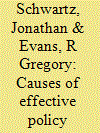| Srl | Item |
| 1 |
ID:
076965


|
|
|
|
|
| Publication |
2007.
|
| Summary/Abstract |
This paper studies China's response to the Severe Acute Respiratory Syndrome (SARS) epidemic in 2003. It first assesses the current nature, structure and development of the Chinese infectious disease system, and then evaluates the state response to infectious disease epidemics. Turning to the role of non-state actors, it discusses their contributions to the state's efforts. Following a case study of Shaanxi province, it concludes that the SARS outbreak reveals the state's capacity to re-centralize power in the face of high-priority events. However, it also concludes that this government capacity alone, while necessary, is not sufficient to overcome SARS.
|
|
|
|
|
|
|
|
|
|
|
|
|
|
|
|
| 2 |
ID:
078761


|
|
|
| 3 |
ID:
078837


|
|
|
|
|
| Publication |
2007.
|
| Summary/Abstract |
This article examines the relationship between intellectual property (IP) and public health, with a focus on the extension of AIDS treatment in the developing world. While most of the literature on IP and health examines the conditions affecting poor countries' capacities to acquire essential medicines, I show the distinct-and more complicated-political economy of production and supply. IP regulations alter the structure of generic pharmaceutical sectors in the countries capable of supplying essential medicines, and changes in market structure affect actors' economic and political interests and capacities. These new constellations of interests and capacities have profound implications for the creation and maintenance of political coalitions in support of on-going drug supply. The result is that the global AIDS treatment campaign becomes marked by mismatches of interests and capacities: those actors capable of taking the economic, legal, and political steps necessary to increase the supply and availability of essential drugs have diminished interest in doing so, and those actors with an interest in expanding treatment may lack the capacities to address the problem of undersupply. By focusing centrally on actors' interests in and capacities for economic and political action, the article restores political economy to analysis of an issue-area that has been dominated by attention to international law. And by examining the fragility of the coalitions supporting the production and supply of generic drugs, the article points to the limits of transnational activist networks as enduring agents of change.
|
|
|
|
|
|
|
|
|
|
|
|
|
|
|
|